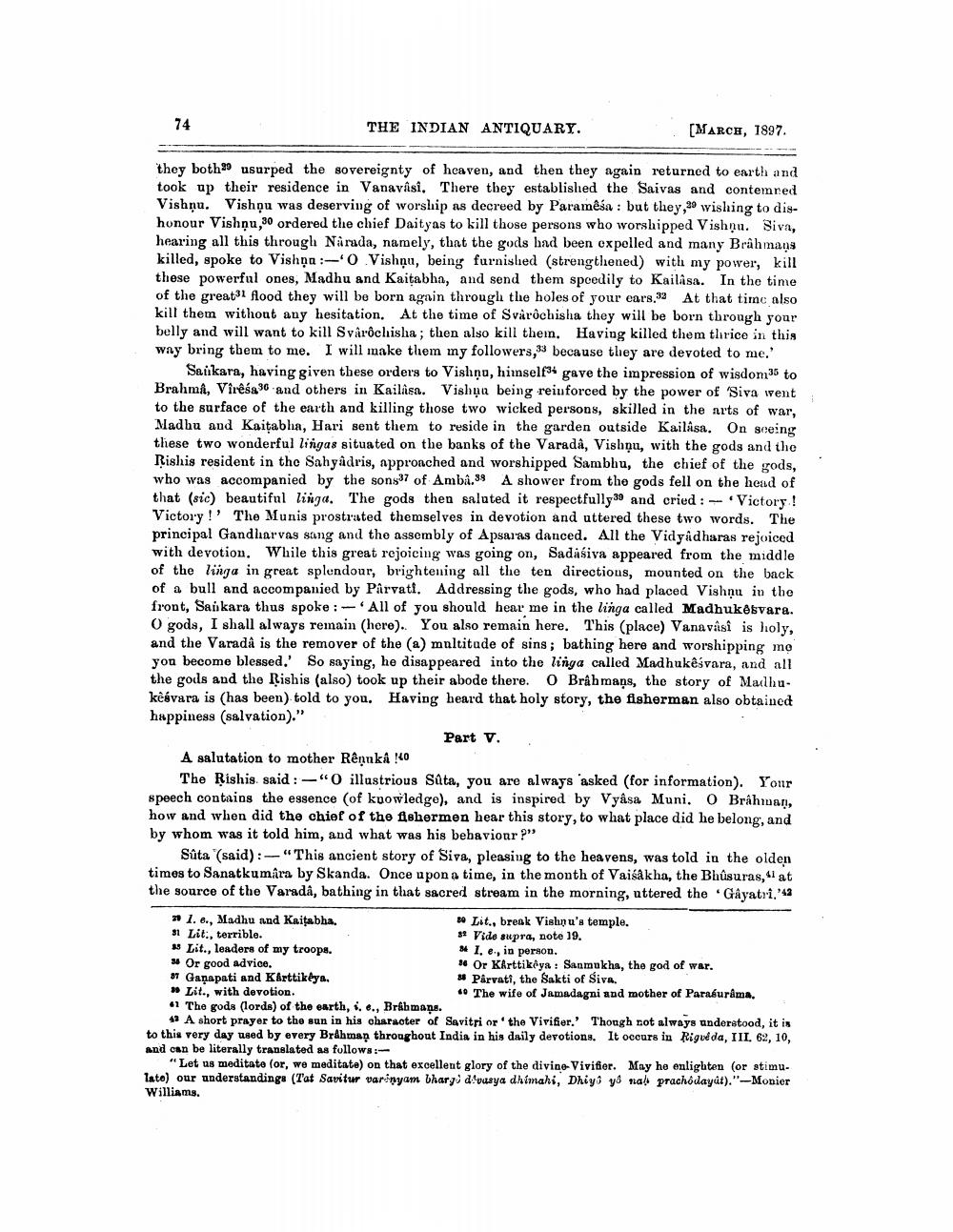________________
THE INDIAN ANTIQUARY.
[MARCH, 1897.
they both usurped the sovereignty of heaven, and then they again returned to earth and took up their residence in Vanavâsî. There they established the Saivas and contemned Vishnu. Vishnu was deserving of worship as decreed by Paramêsa: but they,20 wishing to dishonour Vishnu,30 ordered the chief Daityas to kill those persons who worshipped Vishnu. Siva, hearing all this through Narada, namely, that the gods had been expelled and many Brahmans killed, spoke to Vishna :-O Vishnu, being furnished (strengthened) with my power, kill these powerful ones, Madhu and Kaiṭabha, and send them speedily to Kailasa. In the time of the great flood they will be born again through the holes of your ears.32 At that time also kill them without any hesitation. At the time of Svarôchisha they will be born through your belly and will want to kill Svårôchisha; then also kill them. Having killed them thrice in this way bring them to me. I will make them my followers,33 because they are devoted to me.'
74
Sankara, having given these orders to Vishnu, himself gave the impression of wisdom35 to Brahmâ, Virêsa30 and others in Kailasa. Vishnu being reinforced by the power of 'Siva went to the surface of the earth and killing those two wicked persons, skilled in the arts of war, Madhu and Kaiṭabha, Hari sent them to reside in the garden outside Kailasa. On seeing these two wonderful lingas situated on the banks of the Varada, Vishnu, with the gods and the Rishis resident in the Sahyadris, approached and worshipped Sambhu, the chief of the gods, who was accompanied by the sons37 of Ambâ.39 A shower from the gods fell on the head of that (sic) beautiful linga. The gods then saluted it respectfully39 and cried: Victory! Victory! The Munis prostrated themselves in devotion and uttered these two words. The principal Gandharvas sang and the assembly of Apsaras danced. All the Vidyadharas rejoiced with devotion. While this great rejoicing was going on, Sadasiva appeared from the middle of the linga in great splendour, brightening all the ten directions, mounted on the back of a bull and accompanied by Pârvati. Addressing the gods, who had placed Vishnu in the front, Sankara thus spoke: All of you should hear me in the linga called Madhukėsvara. O gods, I shall always remain (here). You also remain here. This (place) Vanavâsî is holy, and the Varada is the remover of the (a) multitude of sins; bathing here and worshipping me you become blessed.' So saying, he disappeared into the linga called Madhukêśvara, and all the gods and the Rishis (also) took up their abode there. O Brâhmans, the story of Madhukêsvara is (has been) told to you. Having heard that holy story, the fisherman also obtained happiness (salvation)."
A salutation to mother Rênnka 40
The Rishis said:"O illustrious Sûta, you are always asked (for information). Your speech contains the essence (of knowledge), and is inspired by Vyasa Muni. O Brahman, how and when did the chief of the fishermen hear this story, to what place did he belong, and by whom was it told him, and what was his behaviour ?"
Part V.
Sûta (said):-"This ancient story of Siva, pleasing to the heavens, was told in the olden times to Sanatkumara by Skanda. Once upon a time, in the month of Vaisakha, the Bhûsuras,11 at the source of the Varadâ, bathing in that sacred stream in the morning, uttered the 'Gayatri,'42
21. 6., Madhu and Kaitabha.
31 Lit., terrible.
35 Lit., leaders of my troops.
38 Or good advice.
37 Ganapati and Kärttikeya.
Lit., break Vishnu's temple.
52 Vide supra, note 19.
34 I, e, in person.
36 Or Karttikêya: Sanmukha, the god of war.
38 Pârvati, the Sakti of Siva.
* The wife of Jamadagni and mother of Parasurama.
"Lit., with devotion.
41 The gods (lords) of the earth, i. e., Brahmans.
42 A short prayer to the sun in his character of Savitri or the Vivifier.' Though not always understood, it is to this very day used by every Brahman throughout India in his daily devotions. It occurs in Rigveda, III. 62, 10, and can be literally translated as follows:
"Let us meditate (or, we meditate) on that excellent glory of the divine-Vivifier. May he enlighten (or stimu-. late) our understandings (Tat Savitur varinyam bharge divasya dhimahi, Dhiyo yo na prachodayat)."-Monier
Williams.




